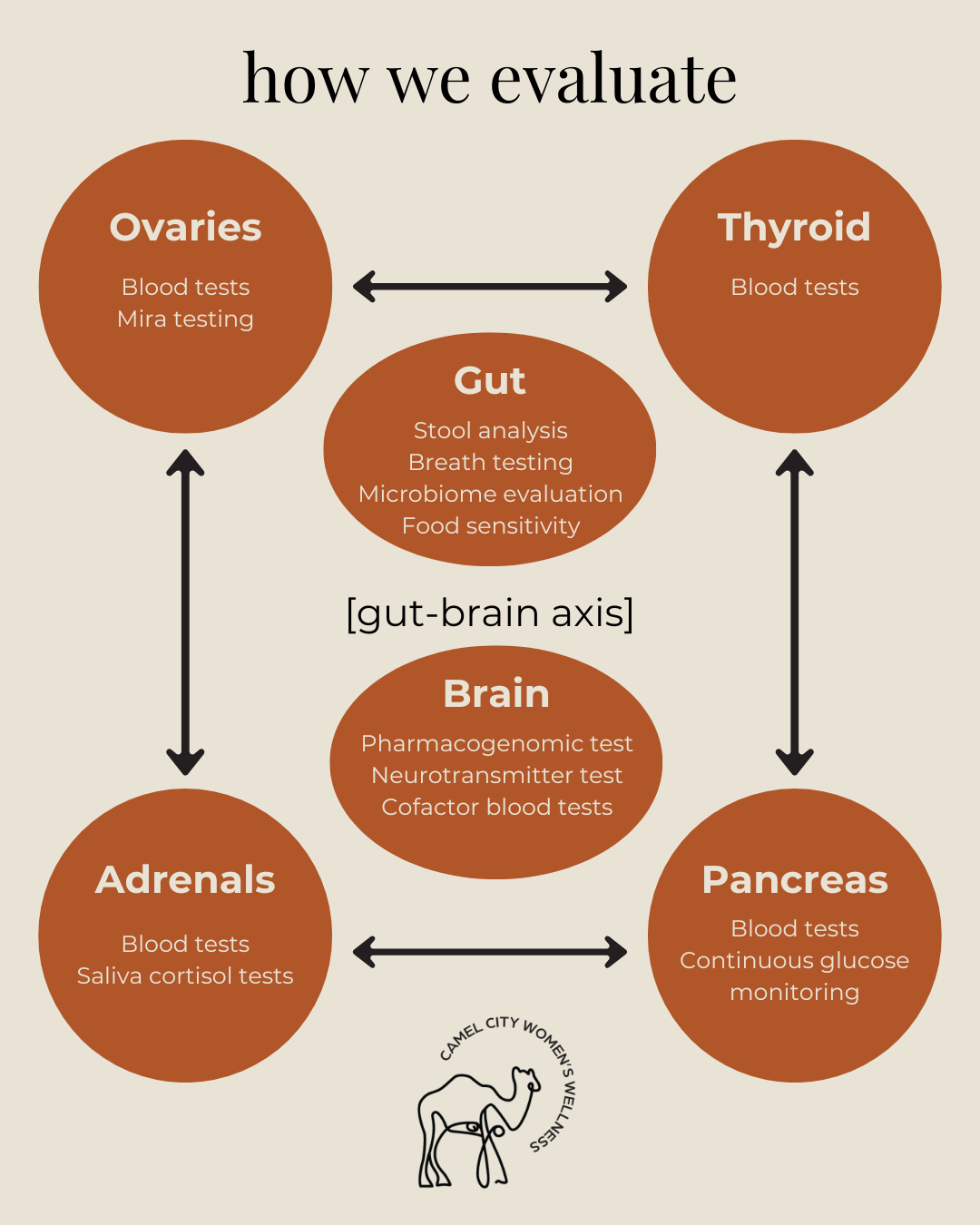A lot of women who we interact with ask the burning question, “is it my hormones?”. The question I always ask back is, which hormones are you concerned about? Are we talking about thyroid hormones, sex steroid hormones ie the menstrual cycle, the hormones that regulate metabolism and digestion, or stress hormones such as cortisol? The answer is, they probably mean all the above. This is what is going through our minds when someone asks that:

As you can see, all of these hormones influence each other because that is what hormones do. They are messengers secreted in one area in the body then go to another area of their body to act.
Most women who come to use are considering, are they in perimenopause? This is a clinical diagnosis, that truly does not need “hormone labs” to define. However, there is a wide spectrum of menstrual and/or reproductive concerns such as PCOS, primary or secondary infertility, anovulatory cycles, and having coordinated cycles – meaning estrogen and progesterone are doing what they are supposed to.
The important piece to note, is that this type of care is highly nuanced personalized. We take into account her key symptoms, her goals, her past medical history, her complete review of symptoms, her menstrual history, her sexual history, her family history (looking for you cardiovascular disease), and her surgical history. We consider her vitals (hello blood pressure), and a focused physical exam if needed. Then we can come up with a plan. Here is our general lab approach:

*Notice that we also consider the gut brain axis. The gut is home of many hormones and the place of hormone and neurotransmitter metabolism. We would be remiss to not consider the role the gut plays in all of this!
So what if we do all this, and determine it’s not “your (sex) hormones”? Well, you certainly do not feel well that’s why we started this conversation, and we like to get to the bottom of that! Here are common things we see that can explain similar symptoms to those of perimenopause. All of these can be evaluated and treated by us!
- Under or untreated mood disorder – depression, anxiety, OCD, and ADHD can all present with fatigue, brain fog, trouble sleeping, sleeping too much, lack of interest, problems with motivation, lack of joy and hopelessness.
- Stress – most of us experience stress, and midlife is no exception. Raising children, caregiving for parents, siblings or spouses, climbing the ladder of your career, going back to school, loss of relationships, grief and trauma all contribute to stress that can manifest in physical and emotional symptoms.
- Thyroid – Thyroid conditions are significantly undertreated, and it is common for the thyroid to experience changes as we age as well. Thyroid symptoms overlap with perimenopausal symptoms, and different than perimenopause, thyroid conditions can easily be ruled in or out with complete thyroid labs.
- Vitamin or mineral deficiency – since the symptoms of perimenopause, especially early perimenopause, can be vague and subtle it is important to make sure there is not a deficiency in the B vitamins, vitamin D, magnesium, zinc and iron stores (ferritin).
- Sleep apnea – There are many different types of sleep apnea, but sleep apnea presents with daytime fatigue and morning headaches. It also leads to difficulty loosing weight, elevated blood pressure, insulin resistance, diabetes, and cardiovascular disease. Sleep apnea should be rule out with a sleep test.
- Insulin resistance, prediabetes or diabetes – It is true that your hormones, particularly estrogen, influence insulin sensitivity, but it is also important to evaluate for insulin resistance or new onset diabetes. In fact, elevated blood sugar is a cause for hot flashes, fatigue, increased urination, and changes in weight – all seen during perimenopause.
If you still have questions and want to know more, feel empowered to talk to your own healthcare provider, know specifically what labs to ask for, we recommend checking out our course Reclaim Your Perimenopause.





